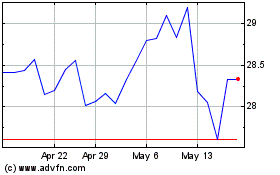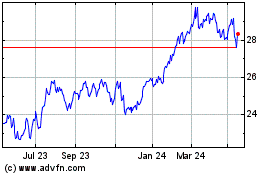UPDATE: Samurai Market Reborn As Foreign Banks Sell Bonds
February 20 2009 - 4:33AM
Dow Jones News
Two more foreign banks offered Samurai bonds in Japan on Friday,
the latest sign that a market that ground to a halt after the
failure of Lehman Brothers Holdings Inc. last fall is whirring back
to life.
Export Development Canada sold Y31.6 billion worth of five-year
floating-rate Samurai bonds - yen-denominated debt issued in Japan
by foreign borrowers. The bonds carry a coupon of 35 basis points
above three-month London interbank offered rates.
Meanwhile, Netherlands' Cooperatieve Centrale
Raiffeisen-Boerenleenbank B.A., which is also known as Rabobank,
raised Y27.5 billion in a five-year floating-rate note, paying a
coupon of 140 basis points above Libor.
The two deals underscore how the market has come back from the
dead since last September, when Lehman's failure shuttered what was
one of the more active funding markets since the financial crisis
hit. With Japanese investors less and less receptive to foreign
credits, several companies canceled their planned Samurai sales,
including Deutsche Bank AG and National Grid Gas.
The market's resurrection began in early February when
Australia's Westpac Banking Corp. offered the first-ever
government-guaranteed Samurai, worth Y201.3 billion.
Australia & New Zealand Banking Group. later followed suit,
issuing a total of Y180 billion government-backed yen bonds in
Japan's wholesale and retail markets.
One reason behind the recent revival is that, with the markets
relatively calm lately, overseas issuers are in a hurry to raise
funds before any other potential shock can hit, analysts say.
But others say a government guarantee - or an equivalent
assurance - is a must for successful Samurai sales right now.
"One main theme for the Samurai market at the moment is support
from government," said Akira Nomura, a credit analyst at Mizuho
Securities. "Japanese investors are unlikely to be able to buy
Samurais without government backing," as their portfolios - and
risk appetite - have been damaged by the financial turmoil.
Friday's two issues fit the case: Export Development Canada is
wholly owned by the Canadian government.
Although Rabobank's bonds aren't directly guaranteed by the
government, the top ratings from Standard & Poor's and Moody's
Investors Service and the Dutch government's October bailout of ING
Groep N.V. provided similar security to domestic buyers, analysts
say.
The fact that investors were willing to purchase Rabobank's debt
without an explicit government guarantee could be "one sign of a
gradual recovery of the credit market," said Kazuhide Tanaka, head
of international debt syndication at Mitsubishi UFJ Securities,
which co-led the Rabobank deal.
But he added, "it's still being tested how much room investors
have to absorb a flood of Samurai issuance in a shrinking
market."
Without the government guarantee, of course, Rabobank was forced
to pay a far wider spread than Export Development Canada. Still,
Mizuho's Nomura said other issuers may now decide to come back to
the Samurai market, "if the investor base broadens on factors such
as increased money flow from pension funds and easiness in tracing
current prices."
-By Megumi Fujikawa, Dow Jones Newswires; 813-5255-2929; megumi.fujikawa@dowjones.com
Australia And New Zealan... (ASX:ANZ)
Historical Stock Chart
From Sep 2024 to Oct 2024

Australia And New Zealan... (ASX:ANZ)
Historical Stock Chart
From Oct 2023 to Oct 2024
